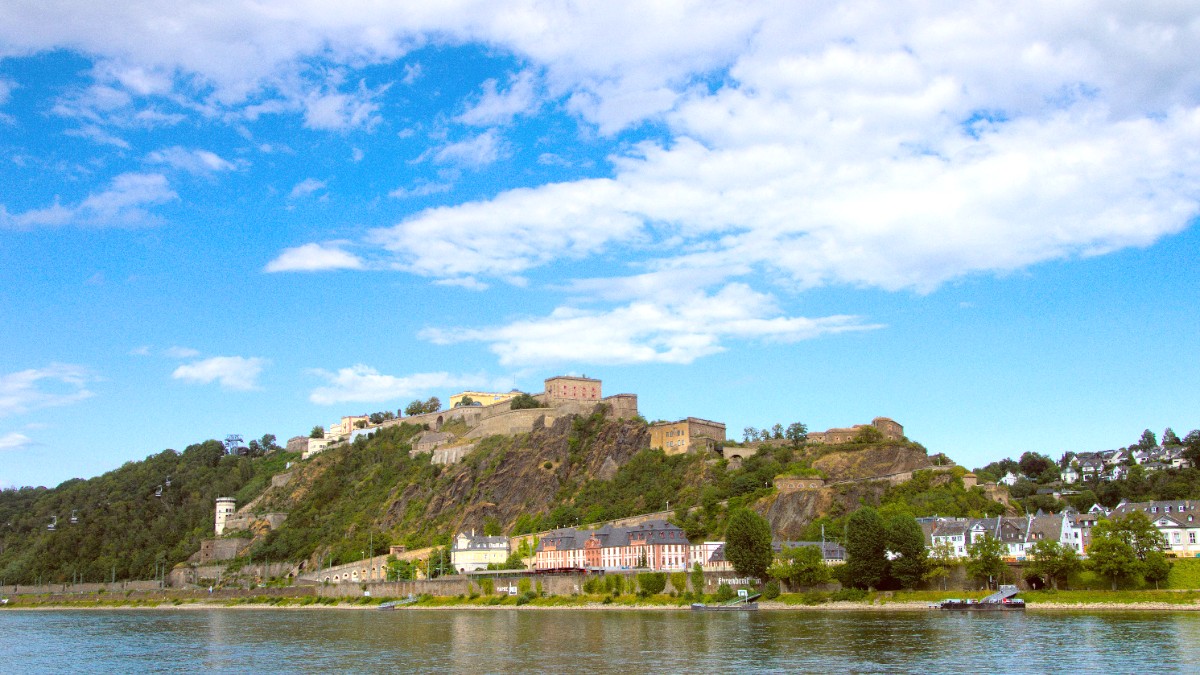
Germany
Koblenz sits at the gateway to the UNESCO World Heritage Upper Middle Rhine Valley. Visitors are encouraged to stay on marked trails and avoid disturbing wildlife or plants.
Germany maintains highly developed waste separation and recycling systems. Use color-coded bins for proper waste disposal. Bring reusable water bottles and shopping bags.
Consider offsetting flight emissions through reputable carbon offset programs. Prioritize public transport (trains, buses) over private cars for inter-city travel.
Responsible environmental practices are important for preserving the region's natural beauty.
Germany operates highly efficient waste separation and recycling systems. Public bins often separate waste by type. Guests are encouraged to separate waste according to hotel or apartment guidelines. Responsible water use, like shorter showers and turning off taps, receives encouragement.
Consider offsetting your flight emissions through reputable carbon offset programs like Terrapass. Within Germany, prioritize public transport (trains, buses) over private cars. Walking and cycling offer emission-free modes of transport. Look for hotels with environmental certifications or active sustainable practices. Support tour operators committed to responsible tourism.
Respectful interaction with local culture enhances your experience and promotes a positive impact. Support local cultural institutions and historical preservation. Polite greetings and basic German phrases are appreciated. Be mindful of noise levels, notably in residential areas or on public transport. Photography is generally allowed in public spaces, but ask for permission before taking close-up photos of individuals. Observe signs regarding photography restrictions in museums or private establishments. Modest dress is appropriate when visiting churches or religious sites.
Your travel choices directly influence the local economy. Support local businesses like family-run restaurants, independent shops, and local guides. Seek out locally made products and souvenirs sold directly by artisans. This directs money to producers and supports traditional craftsmanship. Look for "Made in Germany" labels or items clearly representative of the region. Avoid activities that exploit local communities, animals, or the environment. Do not engage in activities involving animal cruelty or human exploitation, and avoid informal sellers of counterfeit goods.
Minimize waste by using reusable products from Package Free Shop.
Explore ProductsAdopting sustainable and responsible travel practices contributes positively to the preservation of Koblenz's environment and culture, supporting its community.
Your travel choices influence the local culture and economy.
Respectful interaction with the local culture improves your experience. Support local cultural institutions, museums, and historical preservation efforts. Polite greetings, basic German phrases, and awareness of noise levels contribute positively. Ask for permission before taking close-up photographs of individuals. Observe any photography restrictions in museums or private establishments. Modest dress is appreciated when visiting churches or religious sites.
Your travel choices directly influence the local economy. Choose family-run restaurants, independent shops, and local guides over large international chains. This supports local livelihoods and preserves Koblenz's unique character. Seek out locally made products and souvenirs. Avoid activities that might exploit local communities, animals, or the environment.
Adopting sustainable practices contributes positively to the preservation of Koblenz's environment and culture. Look for environmentally certified accommodations and support ethical tour operators. Consider offsetting your carbon footprint, and utilize Germany's efficient public transport system. Your choices have a direct impact on the destination's well-being.
Choose hotels with environmental certifications or active sustainable programs like Ecobnb.
Support operators committed to ethical tourism, such as G Adventures.
Offset your flight emissions through programs like Terrapass.
Making conscious choices in Koblenz supports both the environment and the local community, creating a more meaningful visit for everyone.
Engaging in responsible practices preserves Koblenz's unique character.
Koblenz sits at the gateway to the UNESCO World Heritage Upper Middle Rhine Valley, a landscape recognized for its outstanding cultural and natural value. This designation reflects a commitment to conservation. Visitors are encouraged to stay on marked trails, especially when hiking in nature reserves. Respect natural habitats by not disturbing wildlife or plants, and avoid littering.
Germany operates highly developed waste separation and recycling systems. Public bins often separate waste by type (paper/cardboard, plastic/packaging, residual waste, glass). Guests are encouraged to separate waste according to hotel or apartment guidelines. Use reusable water bottles and shopping bags. Consider offsetting flight emissions through reputable carbon offset programs. Prioritize public transport (trains, buses) over private cars.
Respectful interaction with the local culture enhances your experience. Support local cultural institutions, museums, and historical preservation efforts. Polite greetings and basic German phrases are appreciated. Be mindful of noise levels, especially in quiet residential areas or on public transport. Photography is generally allowed in public spaces, but ask for permission before taking close-up photographs of individuals. Observe any signs regarding photography restrictions in museums or private establishments. Modest dress receives appreciation when visiting churches or religious sites.
Your travel choices directly influence the local economy. Support local businesses, including family-run restaurants, independent shops, and local guides, over large international chains. This directs economic benefits within the community and preserves Koblenz's unique character. Seek out locally made products and souvenirs sold directly by artisans or at reputable, independent shops. This supports traditional craftsmanship. Be aware of activities that might exploit local communities, animals, or the environment. Do not engage in activities involving animal cruelty or human exploitation.
Responsible travel includes choosing accommodations and tours that align with sustainable values. Look for environmental certifications and support operators committed to eco-friendly practices.
Seek hotels with environmental certifications or active sustainable practices, such as those found on Ecobnb.
Support tour operators committed to responsible tourism, like G Adventures, that prioritize sustainable activities.
Purchase gifts and products from local businesses and consider Package Free Shop for reusable items.
Avoid involvement in any activities that exploit local communities, animals, or the environment. This is generally not a significant concern in Germany due to strong regulations, but informed choices remain important. Do not purchase counterfeit goods.
By adopting these sustainable and responsible travel practices, you contribute positively to the preservation of Koblenz's environment and culture, supporting the well-being of its community, making your visit more meaningful for everyone.